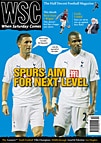 The menace of meddling chairmen
The menace of meddling chairmen
“The only crisis we have here is when we’ve run out of champagne in the boardroom,” said John Cobbold when Ipswich chairman. The Cobbolds, whose family brewery was one of the town’s main employers, are often held up to exemplify the attitude of the patrician dynasties who used to own many teams. They may have looked upon their clubs as heirlooms – one of the last of the breed, Peter Hill-Wood at Arsenal, has been magnificently disdainful of the rumoured interest in the club from US billionaire Stan Kroenke – but they also knew better than to interfere with the manager’s role.
There are still a few low-key, local-based club owners around, but they’re in a small minority – nowadays it seems that anyone who watches games from the directors’ box thinks he knows how to run a team. A month into the new season and meddling is rife. Mike Ashley, Newcastle’s new owner, let it be known that he would like to find a role at the club for Kevin Keegan, which duly generated an explosive response from Sam Allardyce. The limelight-hogging Milan Mandaric, who seems to have learned precisely nothing from 30 years in club ownership, dumped Martin Allen after a month in charge of Leicester, seemingly because they disagreed over signings. And of course we had Roman Abramovich making a sudden and unsuccessful lunge for Ronaldinho.
By far the most unedifying scenes, however, have taken place at Spurs. The board decided that Martin Jol had to be replaced after successive defeats at the start of the season but then failed to land their target, Juande Ramos of Sevilla, and had to backtrack. But Jol was reminded of his responsibilities. Chairman Daniel Levy, in reality an employee of Bahamas-based businessman Joe Lewis, whose company ENIC holds a controlling stake in Spurs, announced that he had a mission: “I am an ambitious chairman; we are an ambitious club and we want Champions League football at White Hart Lane.”
Premier League executives such as Levy are prone to drawing parallels between their clubs and the world of big business, but you do wonder if company chairmen in other areas of the economy announce publicly that they need to be in the top four in their sector. Such a statement also fails to acknowledge a significant difference between the top-four Premier League teams and, say, the top-four supermarkets. The rewards in terms of income and profile provided by the Champions League make it impossible to close the gap from fifth to four gradually. Either you pull it off, or you are back to square one with all the rewards going to rivals, as Spurs found out in 2005-06.
Levy’s pronouncements appeared to be designed mostly to strike a chord with his boss. Given that a blatant attempt was made to unseat him, Jol has behaved with admirable restraint and seems set to carry on for now. Large sums have been spent as the team have achieved consecutive fifth-place finishes, a consistency last bettered in 1982 and 1983, but it’s clear that some of the frantic buying and selling that’s taken place at Spurs over the past two years has been against Jol’s wishes. Sporting director Damien Comolli is known to have insisted that certain players be brought in, while Levy personally took charge of the contract negotiations with Michael Carrick that ended in acrimony, with the player being sold to Manchester United when he wanted to stay. Levy eventually offered more than Carrick had originally asked for, but only after botching the negotiations so badly that the midfielder said no. Yet Levy has the nerve to criticise Jol’s management skills and to ban newspapers with columnists who treat him with the ridicule he deserves.
In fact, salaries are the best indicator of the trick Levy and Co are trying to pull off. A survey by City firm Deloitte revealed that in 2005-06 – the last season for which figures are available – Spurs paid £41 million in wages. A great deal, but less than half Arsenal’s and Manchester United’s totals, not much more than a third of Chelsea’s, less than two-thirds of Liverpool’s and £11m less than Newcastle’s. Jol’s squad have punched well above their financial weight.
So it is clear that the Spurs board are making unrealistic demands, but one key question remains. The club’s vice chairman, Paul Kemsley, claimed bizarrely that Ramos was approached because they thought Jol might leave: “It’s wonderful to have a beautiful wife, but it can make you insecure and worried that you might lose her. That’s how I feel about Martin.” Has anyone asked Mrs Kemsley how she would feel if her husband offered this excuse for propositioning another woman?
From WSC 248 October 2007